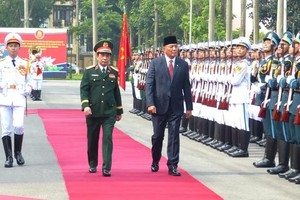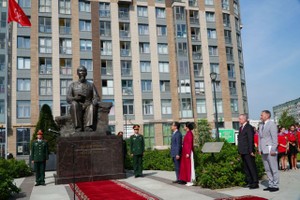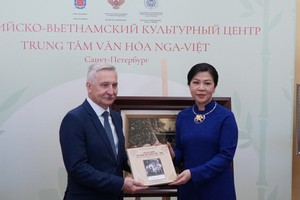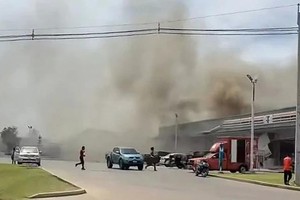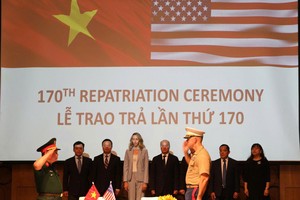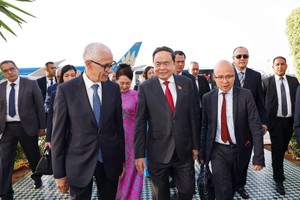PORT-AU-PRINCE (AFP) – The United States said it will resume airlifting critically injured earthquake victims from Haiti after a row over who would pay for their care halted flights.
The news emerged after Haitian police detained 10 members of a US Christian charity group who allegedly tried to leave the country with more than 30 children who survived the devastating quake.
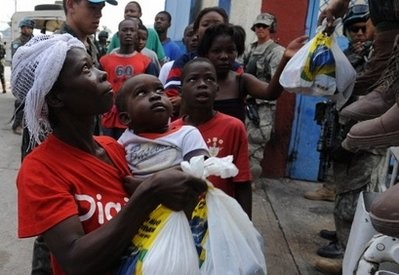
The UN food agency was also launching a massive food effort targeted at vulnerable women in a bid to ease some of the chaos surrounding the massive international relief effort for the January 12 disaster.
"The flights are on track to resume in the next 12 hours," said White House spokesman Tommy Vietor. "We are working with the Haitian government and the international community to meet this urgent need and save lives."
The US military said Saturday it had stopped medical evacuations of the critically injured until a row over who will pay for their care was settled.
"Given concerns about the strain on domestic health capacity, we worked to increase cooperation with our international partners, NGOs and states to expand access to additional facilities" to care for the gravely hurt, Vietor said.
Once US officials confirmed there were more medical centers available both in the United States and abroad to treat the Haitians, "we determined that we can resume these critical flights," Vietor said.
Flights carrying people with spinal injuries, burns and other wounds ended Wednesday after Florida Governor Charlie Crist asked the federal government to shoulder some of the cost of the care, US media reported.
The 7.0-magnitude quake killed around 170,000 people, wounded around 200,000 and left more than one million homeless and desperately short of food, water and medical attention.
Amid warnings that child traffickers could take advantage of the quake chaos, Haitian police seized five men and five women with US passports and two Haitians as they tried to cross into the neighboring Dominican Republic with a busload of children aged between two months and 14 years.
Border police "saw a bus with a lot of children. Thirty-three children. When asked about the children's documents, they had no documents," Haitian Culture and Communications Minister Marie Laurence Jocelyn Lassegue said.
Speaking just outside her detention cell near Port-au-Prince airport, Laura Silsby, head of the Idaho-based New Life Children's Refuge charity, said the group's aims were entirely altruistic.
"We came here literally to just help the children. Our intentions were good," Silsby told AFP. "We wanted to help those who lost parents in the quake or were abandoned."
But Patricia Vargas, director of the Haitian center where the children are being cared for, said that most of the youngsters insist they still have family.
Some of the older children had spoken to aid workers and "say their parents are alive, and some of them gave us an address and phone numbers," she said.
The US embassy in Port-au-Prince said the group was being held for "alleged violations of Haitian laws related to immigration."
Haitian officials have raised concerns about child trafficking and warned that legitimate adoption agencies may rush to take orphans before proper checks have been conducted.
"Everything is disorganized since January 12 and some people are using it to devote themselves to a veritable trade in children," said Jeanne-Bernard Pierre, director of Haiti's Institute of Social Welfare.
With fears that food is still not reaching enough people, the World Food Program said it would open 16 fixed collection sites in Port-au-Prince Sunday, aiming to feed two million people in two weeks. Related article: Historic Haiti market burns
Only female quake survivors will be allowed at the sites to avoid scenes at chaotic mobile handouts that have sometimes seen children and women muscled aside in the scramble for bags of rice, beans and cooking oil.
The US-led aid effort has drawn criticism for a lack of coordination and Haitians, many of whom are living in squalid makeshift tent camps, have complained that relief has been slow to reach them.
Haitian Prime Minister Jean-Max Bellerive made a fresh appeal for 200,000 tents before the country's rainy season starts, most likely in May. Related article: Big business urged to help
"We are very aware of the consequences to all of the people on the streets if it's starting to rain," Bellerive told CNN, adding that the government only had 3,500 tents so far.
Diseases such as diarrhea, measles, and tetanus are rising in tent camps, prompting UN agencies and the government to prepare a mass vaccination drive, while survivors also face rising insecurity with reports of rape and violence.
Aid officials have warned that the reconstruction process in Haiti, already the poorest country in the Americas before the quake, will take decades.

